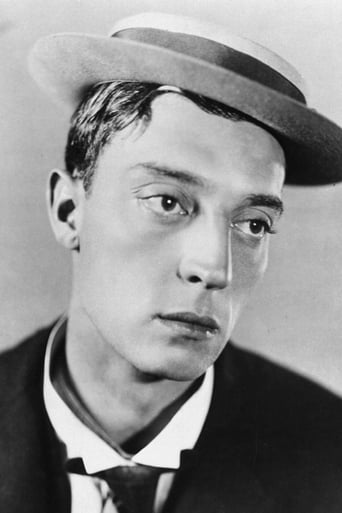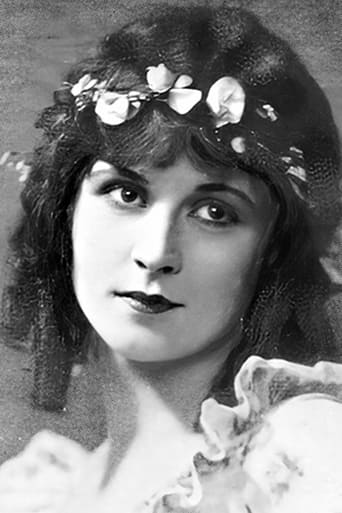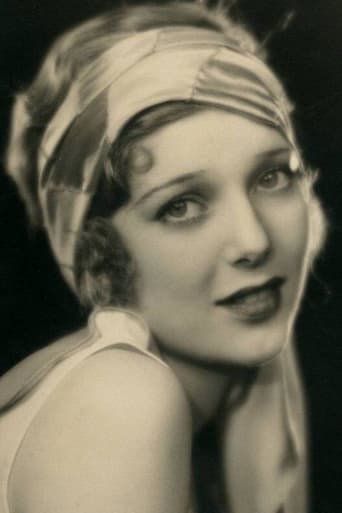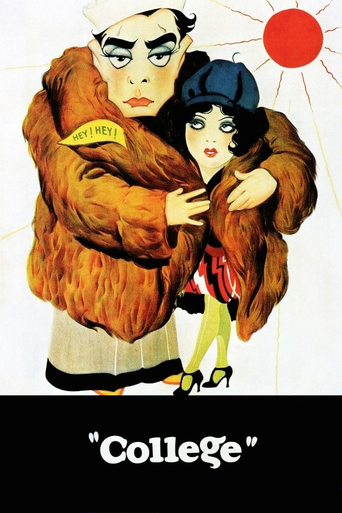
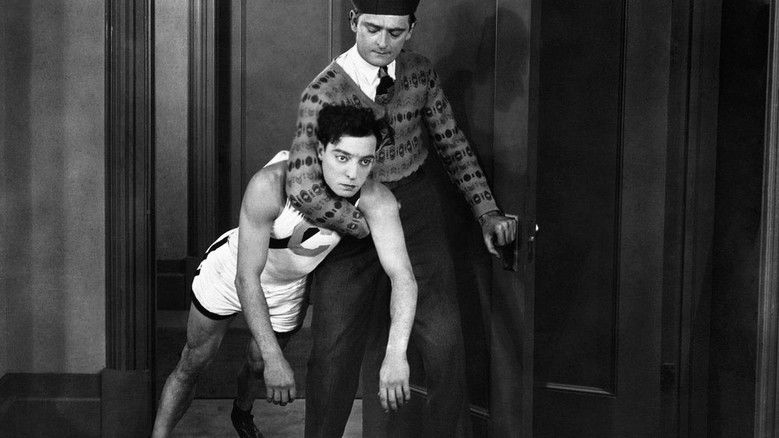
College (1927)
A bookish college student dismissive of athletics is compelled to try out sports to win the affection of the girl he loves.
Watch Trailer
Cast


Reviews
The title reminded me of John Belushi's sweatshirt in "Animal House", but Buster Keaton's "College" is a totally different kind of movie. Keaton plays a bookish student whose girlfriend leaves him after he disses athletics in his graduation speech. Still in love with her, he decides to attend the same college that she does. From there, most of the movie is Keaton showing off his physical humor.There is one very politically incorrect scene, but I suspect that the sign on the restaurant is an accurate depiction of that era. The best parts are the scenes where Keaton attempts to play sports. They must have really had fun filming the boat race.So, even though this isn't Keaton's best movie, there's no shortage of laughs. The soda fountain was certainly a hoot (as are the scenes of pranks at the hands of the other students). Definitely worth seeing.
The consensus seems to be that "College" is good, but it isn't up to the level of Buster Keaton's best other efforts from this era. Having watched it, I can't really disagree with that assessment. There's plenty of good material here and the star, of course but it's difficult not to compare it with Keaton's other work, and somehow it doesn't really feel like a Buster Keaton feature in certain ways.The line of the story is less unified and forceful than in his other films; Buster is a bookworm who goes to college and must pay his way while taking up sports to prove himself to a girl. Instead of the kind of logical sequence of events that drives "The General" or flight of stunningly bizarre imagination that marks "Sherlock Jr," "College" is more of an episodic series of sequences in which Buster tries out various new sports and jobs at his new school.This keeps the story from moving quickly or becoming as involving as it could be, but the upside is that these are mainly handled in a very funny way, with Buster showing off his seemingly innate ability to turn any setting (i.e. a soda jerk's counter) into a treasure chest of natural physical comedy. Probably the highlight of the film is the extended sequence where we get to see Buster have fun generating comedy from his and my favorites sport -- baseball. One can see the enthusiasm as he plays third base in catcher's gear and finds a way to make three outs for his team in one play.One could believe that Buster's character here is a younger version of his sheltered professor from "Speak Easily," and like that later film this one is funny even if it doesn't always make full use of his particular comedy abilities and style. It feels a little more typical than most of his best comedies, and doesn't feature many of the large-scale and involved mechanical gag sequences that he excelled at until the thrill ending in which Keaton gets the girl. Perhaps as a contrast to the more conventional nature of the story and some of the comedy in this feature, Keaton ends the film which a brilliant gag that subverts the typical "Hollywood ending" in just a few utterly logical and hilarious seconds.This is a good comedy and well worth a viewing for the comedy Buster Keaton brings to failure at the various sports and jobs at attempts in it, but as a film it has to be said that it is less than well-structured and dynamic.
The sophomoric 1927 Buster Keaton silent comedy "College" lacks the overall creativity of "The General" (1927), "Steamboat Bill, Jr.," (1928) and "The Cameraman" (1928). Buster's gags and routines are tame compared with the three aforementioned epics. Nevertheless, "College" isn't completely without merit. The irony, for example, is that the physically fit Buster plays a protagonist without any athletic ability until the villain endangers our hero's sweetheart. Like Charles Chaplin, Buster exploited incongruity as the source for his comedy. "College" is basically your boy wants girl, boy loses girl, and then boy wins girl nonsense. "On the sunkist slopes of the Pacific where land and water meetCalifornia" reads the opening title card. Rain pelts Union High School auditorium as people huddle under newspapers and umbrellas. The opening 10 minute-plus scene depicts Buster's high school graduation day "where the next step is either to go to college or go to work." Buster arrives at graduation with his mother. Although Ronald has brought an umbrella, his cheap $15 suit shrinks up on him as that he looks ridiculous. This gag and his problems closing an umbrella gag are clever and cute. This is the most non-traditional graduation because nobody wears caps and gowns. They had to otherwise everybody would have looked the same and we would never have seen Buster's suit shrink. All in all, this is the most thought out and calculated sequence in "College."Mary Haynesthe heroine--has a memorable introduction. The male students remove several coats that they had generously allowed her to bundle up in to avoid getting drenched. She is described as "the winner of every popular contest in which the boys were allowed to vote. When she receives his diploma, the principal predicts that she will fit in at Clayton College as she did at Union High School. Star athlete Jeff Brown (Harold Goodwin) appears amid fanfare. He is described "as a man who loved exercise so much that he has made many a girl walk home." When the principal hands Jeff his diploma, he notes that Jeff took seven years to earn it. Lastly, the principal congratulates Buster for being "the most brilliant scholar." Of course, everybody laughs at Buster because his suit has shrunken so much that the buttons on his vest have popped off and his sleeves have retreated virtually to his elbows. Buster alienates everybody at graduation with his anti-athletic speech. As the top student, he receives an honor medal. "The student who wastes his time on athletics rather than study show only ignorance." His words anger Jeff and the other fellows. "Future generations depend upon brains and not upon jumping the discus or hurdling the javelin." Mary (Anne Cornwall) criticizes Ronald. "When you change your mind about athletics then I'll change my mind about you." She rides away with Jeff.Mary enters Clayton College. Neither Ronald nor his mother can afford the tuition, so Ronald looks for a job so he can work his way through school. He gets a temporary job as a soda jerk clerk. He carries a picture of Mary around in his suitcase and boards in the dormitory. The soda clerk job doesn't last long because Ronald is afraid that Mary will see him in such a lowly job and ridicule him so he quits.Dean Edwards (Snitz Edwards) congratulates Ronald about his maturity. He praises him, "A boy like you can make this athlete infested college a seat of learning once more." Eventually, Ronald quits his soda jerk job when Mary enters the shop. Ronald decides he wants to take a try at sports. Ronald gets on the baseball team and his idiotic antics result in his team losing. Jeff and some guys catch him walking home from the disastrous baseball game and toss him on a blanket in the air. He sails so high that he can see an old battle axe dressing through her balcony window. Infuriated, she storms onto the balcony and swats at him with an umbrella. More umbrella buffoonery! He seizes the umbrella and floats up and down until he tears down a balcony and brings down the battle axe on it. Ronald tries out for track and other related athletics and again fails miserably. Pay close attention to these shenanigans because they play an important part in the conclusion. Looking for work, Buster masquerades as an African-American in a restaurant. The black paint on his face smears off when he is serving Jeff and Mary on a date. When the blacks discover that he's an imposter, they run him off. Eventually, the Dean summons our hero to his office and complains about Ronald's failing grades. "I took up athletics because the girl I love thinks I'm a weakling," Buster explains in his own defense. The Dean requests that the rowing coach make Buster the coxswain on the rowboat team. The coach, however, has other ideas and he slips Buster a mickey. Things don't work out for the coach and the person intended to replace Buster gulps the potion. The photography for the boat rowing race is incredibly good. One of the boats has the semi-profane name 'Damfino.' This too must have been pretty risqué for its day.Ultimately, Jeff shows his true antagonistic colors when he locks Mary in her dorm room and stays with her. She warns him that his being caught in her room will mean expulsion for both of them. Jeff points out that he has been expelled already. Mary calls Ronald for help and he responds with alacrity. The last nine minutes of "College" portray Ronald as an entirely different kind of guy and the ending is truly odd. Again, "College" is not top-notch Keaton, but it is worth watching and the DVD is available in a Kino International print on Genius Entertainment for under a dollar in some stores.
College (1927) *** (out of 4) Lesser quality Buster Keaton film has him playing a dorkish book worm who is told by his girlfriend that she doesn't want him unless he becomes an athlete. Once in college Buster goes all out trying to find a sport that he can do. This isn't a masterpiece or even a very good film but it does have plenty of laughs and it's always fun seeing the athletic Keaton dumb it down and not being able to perform all the athletic stuff. I'd say this film was rushed into production after The General tanked at the box office and it's pretty much unlike anything Keaton had done before. You really don't get to see him genius stunts and instead you pretty much just get a one-note joke of a dork trying to be a star athlete. Still, there are plenty of laughs including the best sequence where Keaton, needing a job, gets in blackface only to have it melt off and then he's attacked by the real black folks.


